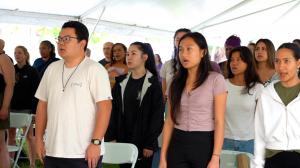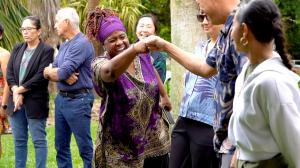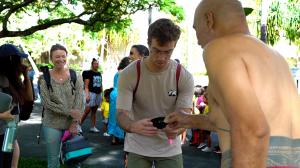VIDEO: UH Mānoa advances racial healing at summit, free workshops
University of Hawaiʻi at MānoaLink to video and sound (details below): https://go.hawaii.edu/9an
In an initiative to foster unity and understanding, the University of Hawai'i at Mānoa hosts the three-day summit “Hawaiʻi Kuʻu Home Aloha” (HKHA) (pronunciation for Home: ho-may). This event from January 16-18 commemorates the 131st anniversary of the overthrow of the Hawaiian Kingdom and the 8th annual National Day of Racial Healing. The summit is aimed at promoting racial healing and reflection on the history, present, and future of Hawai'i.
More than 200 participants gathered on the university’s upper campus for HKHA’s opening day, which focused on uniting attendees from diverse backgrounds to engage in free workshops such as oli (chant), mele (song) and a journey through Hawaiʻi’s past presented by the UH Mānoa Native Hawaiian Place of Learning Advancement Office.
“We need to cultivate stronger connections with one another to pave the way for our children and future generations to embrace the unparalleled values that have shaped Hawaiʻi for centuries. Values like aloha and mālama—genuine care for others—may seem simple, yet in our daily lives they can be easily overlooked,” Kaiwipunikauikawēkiu Punihei Lipe, UH Mānoa Native Hawaiian Affairs Program Officer. “It’s also vital for us to acknowledge painful chapters in our history and then find ways to heal and progress together.”
In Hawaiian, “Hawaiʻi Kuʻu Home Aloha” means “Hawaiʻi, my beloved home,” the second annual event will run through January 18. Organizers request that those who plan to attend register online so that they can make preparations for the anticipated numbers.
Lajoya Reed Shelly, a graduate student majoring in educational administration, appreciates how HKHA works to propel racial healing through simple human to human connection.
“There are things that matter to me as a Black woman that might not matter in the same ways to someone who is Kānaka ʻŌiwi (Native Hawaiian) but if we find out and listen to each other’s story we find those similarities and then we also find out that our liberation is tied up in each other,” Shelly explained.
Honoring legacy and ʻāina
On January 17, HKHA attendees will be encouraged to pause and reflect upon the anniversary of the Hawaiian Monarchy Overthrow, honor the National Day of Racial Healing and commemorate the legacy of Dr. Martin Luther King Jr. A procession will begin at noon to present hoʻokupu (offering) in honor of Hawaiʻi’s last reigning monarch at Ke Ahu o Kamakaʻeha (Liliʻuokalani altar) fronting the Queen Liliʻuokalani Student Services Center. Oli and lei will be gifted to commemorate the Queen’s legacy before proceeding to the Martin Luther King, Jr.’s honorary plaque near the art department on campus. Hoʻokupu and a brief presentation will pay homage to one of the most prominent leaders in the civil rights movement.
Participants will also have the opportunity to mālama ʻāina (care for the land) to learn and tend to on-campus plants.
Healing and restoring
The final day of the summit will feature Gail Christopher, a prominent advocate for racial healing, and Kumu Hula Kekuhi Kealiʻikanakaʻoleohaililani as keynote speakers at Kennedy Theatre at 6:30 p.m.
UH Mānoa’s commitment to racial healing
UH Mānoa is one of more than 60 Truth, Racial Healing, and Transformation Campus Centers (TRHT) across Hawaiʻi and the U.S. selected to implement ambitious, visionary action plans that tackle historical and contemporary effects of racism. The TRHT Center at Mānoa is deeply rooted in ʻike Hawaiʻi (Hawaiian knowledge) and led by the NHPoL Advancement Office which helps to shepard the mission for the campus to become a Native Hawaiian Place of Learning.
B-ROLL: (1 minute, 38 seconds)
:00-:35 oli (chant) workshop
:36-1:27 multi-cultural booths
1:28-1:38 mele workshop
SOUNDBITES:
Punihei Lipe/UH Mānoa Native Hawaiian Affairs Program Officer (pronunciation: Poo-knee-hay Lie-puh)
(13 seconds)
“I like to think about the university as the place where we’re shaping the next generation of parents and grandparents, the lawyers, the doctors, the teachers of our neighborhoods. And so how do we think about the ways that we are helping them to heal from the disconnects that they’ve experienced in an intergenerational way.”
(16 seconds)
“Aloha is something that we can share with the world. Not to say it’s the only way but it’s something we can invite people to reflect on. What is your version of aloha, of being in connection of being in reciprocity that is from your places and how do we uplift that and re-remember that to help take care of one another and reconnect.”
Lajoya Reed Shelly/UH Mānoa graduate student
(16 seconds)
“There are things that matter to me as a Black woman that might not matter in the same ways to someone who is Kānaka ʻŌiwi (Native Hawaiian) but if we find out and listen to each other’s story we find those similarities and then we also find out that our liberation is tied up in each other.”



